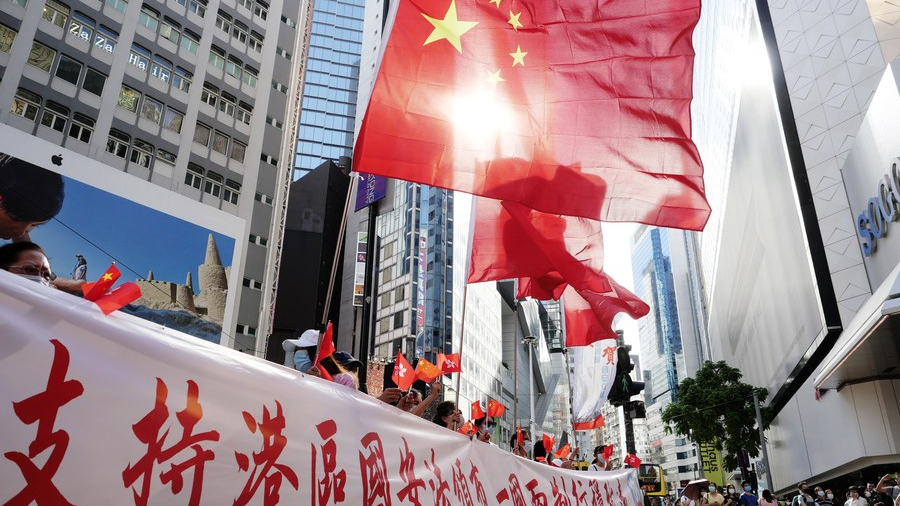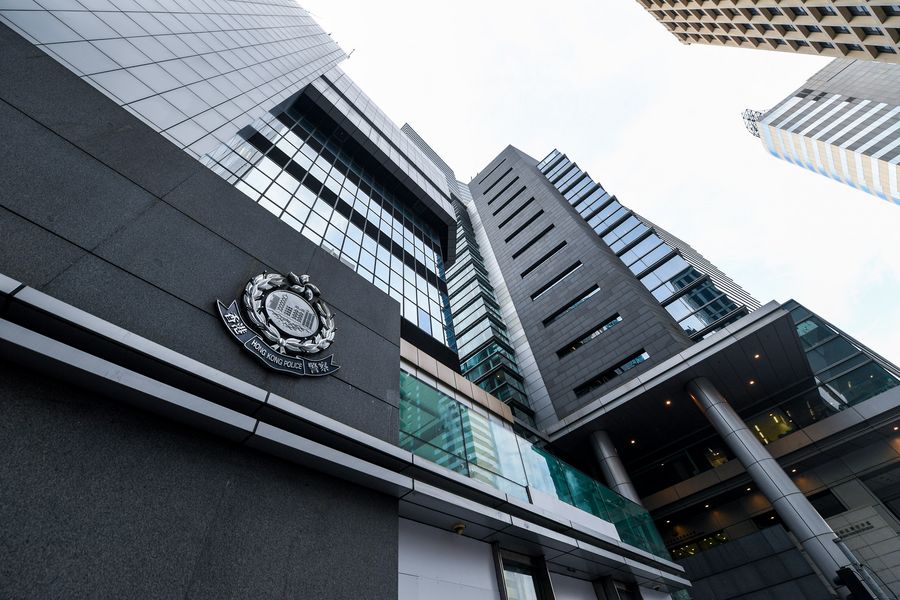
Hong Kong citizens celebrate the passage of the Law of the People's Republic of China on Safeguarding National Security in the Hong Kong Special Administrative Region (HKSAR) in Causeway Bay of south China's Hong Kong, June 30, 2020. /Xinhua
Hong Kong citizens celebrate the passage of the Law of the People's Republic of China on Safeguarding National Security in the Hong Kong Special Administrative Region (HKSAR) in Causeway Bay of south China's Hong Kong, June 30, 2020. /Xinhua
Editor's Note: Pan Deng is a member of the Academic Committee at Charhar Institute, executive director of the Latin America Law Center of China University of Political Science and Law, and distinguished professor at the Center for Latin American Studies at the Southwest University of Science and Technology. The article reflects the author's opinions, and not necessarily the views of CGTN.
Since the inception of the anti-amendment movement in Hong Kong in June, last year, demonstrators stormed the liaison office of the central government and HKSAR Legislative Council, vandalized public and private properties, and blocked main arterial roads. Consequently, the local government was unable to govern; the society was consumed by anger and anguish; and citizens' work and daily lives were greatly interrupted.
The absence of national security legislation aside, even the existing Crimes Ordinance was unable to deter violent behaviors. It was precisely because Hong Kong did not have adequate legal weapons back then that the movement quickly went violent. Mobs smashed buildings, burned stores, beat up citizens and tourists on the streets, even hided guns and explosives on campus, and threw petrol bombs in public places. The vast majority of Hong Kong residents lost their freedom to go to school, return to work, shop and travel, as well as freedom from fear.
Facts are clear that it's the violent rioters who have undermined the rule of law and trampled on human rights. After nearly a year of tumult, more and more Hong Kong residents realize that only in a socially stable and peaceful environment can they enjoy the progress of human rights.
As early as when the central government decided to promulgate a national security law for the HKSAR, the law has been emanating deterrence to whomever standing in the way of safeguarding Hong Kong's prosperity and stability and protecting the legitimate rights of its residents.
Last month, the separatists, opposition politicians, violent activists and abettors uncharacteristically stopped short of taking further provocative moves. A number of leading subversive activists in Hong Kong either announced their withdrawal from the political arena, or attempted to leave the city, or claimed to support the new law. These are signs that the Hong Kong society is going back to normal.
Today, when some people pull the unfashionable trick of claiming the national security law for Hong Kong undermines human rights, fewer people would buy it.

Hong Kong Police Wanchai district headquarters, August 21, 2019. /Xinhua
Hong Kong Police Wanchai district headquarters, August 21, 2019. /Xinhua
A law that respects and protects human rights
Those who play the human rights card to chastise the national security law for Hong Kong may not even have read its provisions. "Respecting and protecting human rights" is an intrinsic feature of this law. Article 4 of the law clearly states:
"Human rights shall be respected and protected in safeguarding national security in the Hong Kong Special Administrative Region. The rights and freedoms, including the freedoms of speech, of the press, of publication, of association, of assembly, of procession and of demonstration, which the residents of the Region enjoy under the Basic Law of the Hong Kong Special Administrative Region and the provisions of the International Covenant on Civil and Political Rights and the International Covenant on Economic, Social and Cultural Rights as applied to Hong Kong, shall be protected in accordance with the law."
The internationally accepted principles of the rule of law that protect human rights, including no punishment without law, presumption of innocence, protection against double jeopardy, and protection of the right to litigation and a fair trial, are also enshrined in this law.
As we all know, crimes against national security are more special, complex, concealed and sensitive than ordinary criminal offences. Applying for writs from the court step by step and taking corresponding actions with full transparency may not be helpful in preventing the possible consequences or obtaining the necessary evidence.
Therefore, this law stipulates that under specific circumstances, police officers with certain qualifications and authorization can conduct searches, freeze properties, restrict exits, and carry out surveillance without warrant. This is in line with the existing legal system of the HKSAR, and is consistent with the relevant regulations of the Anglo-American law system in countries such as the United States, the United Kingdom, and Australia. In fact, the threshold for such specific circumstances set by the national security law for Hong Kong is even higher.
Even so, on July 6, the team designated to oversee national security of the HKSAR still formulated the Implementation Rules for the implementation and supervision of the above measures, and released the Operating Principles and Guidelines to guide operations. This not only makes law enforcement by the police more rule-based, but also lifts the doubts of members of the society. It reassures local residents that human rights will be protected when crimes are cracked down on.
National security and human rights: a balance to be sought, not a choice to be made
Although national security is a perennial topic that arose with the emergence of modern countries, it did not really become an important part of national governance until the 9/11 incident. After that, the United States' defense of national security has gone beyond the traditional debate on the boundaries of human rights. In the ensuing pieces of legislation, existing civil rights were subject to necessary compromise during the operations of intelligence agencies and law enforcement agencies. In the U.S.-led transnational cooperation and international governance against non-traditional security threats, such practice has been increasingly recognized and is becoming an international norm.
Human rights and national security are the core values that should be protected by law, and all countries should regard them as constitutional principles. But in practice, the two inevitably clash with each other, and blindly favoring one principle over the other will only fail both. The chaos in Hong Kong in the past year serves as a painful lesson.
Therefore, this requires the legislator to balance the two propositions and to set limits on the necessary compromise of human rights based on the principle of proportionality. From authorization and legislation at the central government level to detailed rule-making and implementation at the SAR level, every step of the national security legislation is aimed at striking that balance.
(If you want to contribute and have specific expertise, please contact us at opinions@cgtn.com.)